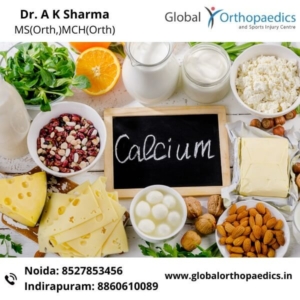Calcium is required by an average adult in the amount of 1,000 mg each day. For women over the age of 50 and males over the age of 71, the dose increases to 1,200 mg per day.

It’s better if you get your calcium through your diet, according to the best Orthoapedic surgeon in Noida which is fairly doable because calcium is a mineral present in many foods. Those who eat a healthy diet are most likely obtain enough calcium.
What calcium supplement is best for osteoporosis?
Some people may struggle to receive enough calcium via their diet, while others may already have bone loss, putting them at risk for osteoporosis.
The less costly choice is calcium carbonate, but it must be taken with a low-iron meal. Additionally, certain drugs prohibit this sort of calcium from being absorbed, so it’s crucial to discuss your medications with your doctor ahead of time.
Are there any negative consequences to using calcium supplements?
One of the main reasons to acquire the bulk of your calcium according to best arthroscopy and joint replacement surgeon in Delhi NCR from food rather than a supplement is potential for negative effects from calcium supplements, which include:
Indigestion symptoms include gas, bloating, and constipation.
Calcium supplements, for example, may produce kidney stones because they cause extra calcium to be excreted through the urine. Furthermore, these supplements may raise a person’s risk of heart disease and prostate cancer, while the data is conflicting and additional study is needed.
Foods high in calcium include:
● Yogurt (simple or Greek),
● Milk (low-fat, skim or whole),
● Cheeses are examples of low-fat dairy (part-skim ricotta, part-skim mozzarella and cheddar),
● Collard greens, kale, bok choy, and broccoli are examples of green leafy vegetables,
● You can eat seafood with soft bones: tinned sardines and salmon,
● Soy products (tofu) and milk replacements (almond milk and soy milk),
Walking, jogging, running, and utilising an elliptical machine will help you keep your bone density in your legs, hips, and lower spine in good shape. Strength training, which includes body weight exercises, aids in the preservation of bones in the upper body, such as the arms and upper spine.
Since there aren’t usually any clear short-term signs of calcium insufficiency, start by visiting your best Orthopaedic surgeon in Delhi NCR like Global Orthopaedics and Sports Injury Centre if you’re concerned about your calcium levels — either owing to your diet or having a history of a sedentary lifestyle. Calcium supplements may be required to complement dietary and activity modifications; however, this is not always the case.


